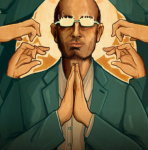The results of yesterday’s primary elections are in.
Sarah Palin wasn’t laughed off the slate and moves on to the November election.
Cheney did not. She was beaten by a pro-Trump stooge.
It’s kind of amazing that a horrible criminal, misogynist, and racist still holds such an oppressive influence on politics in this country.









